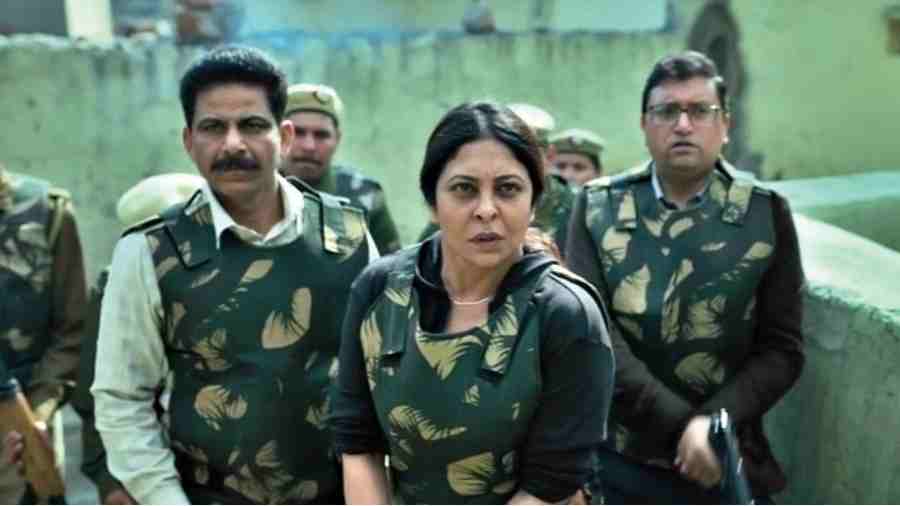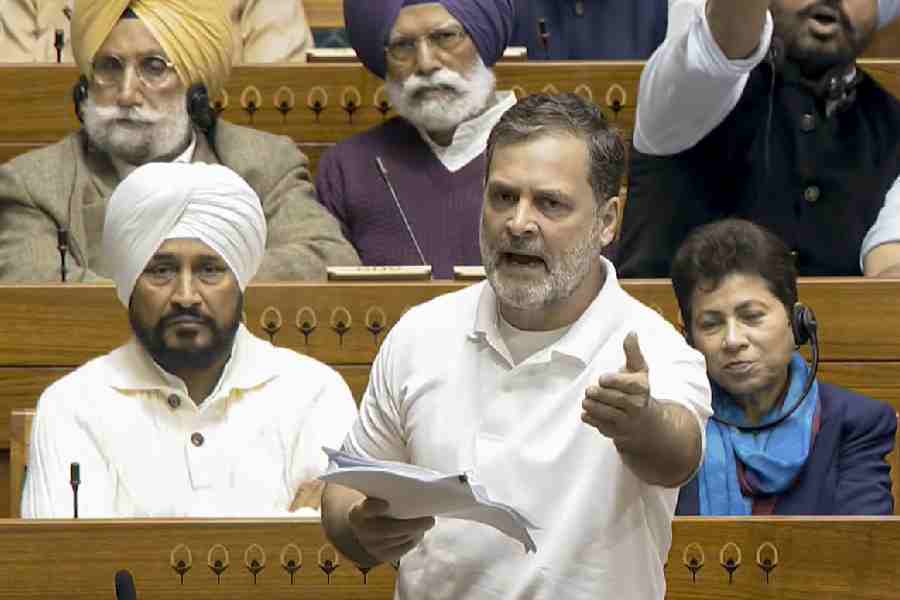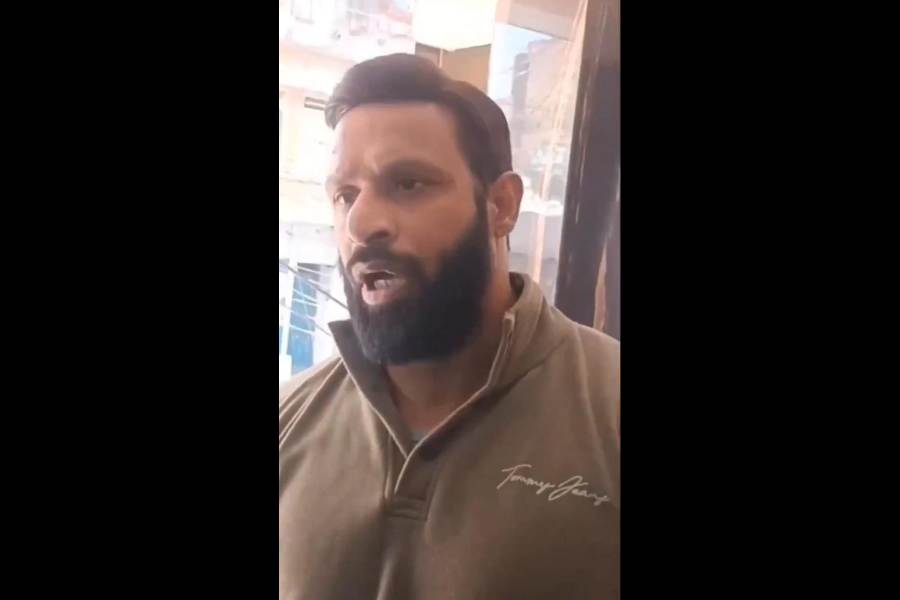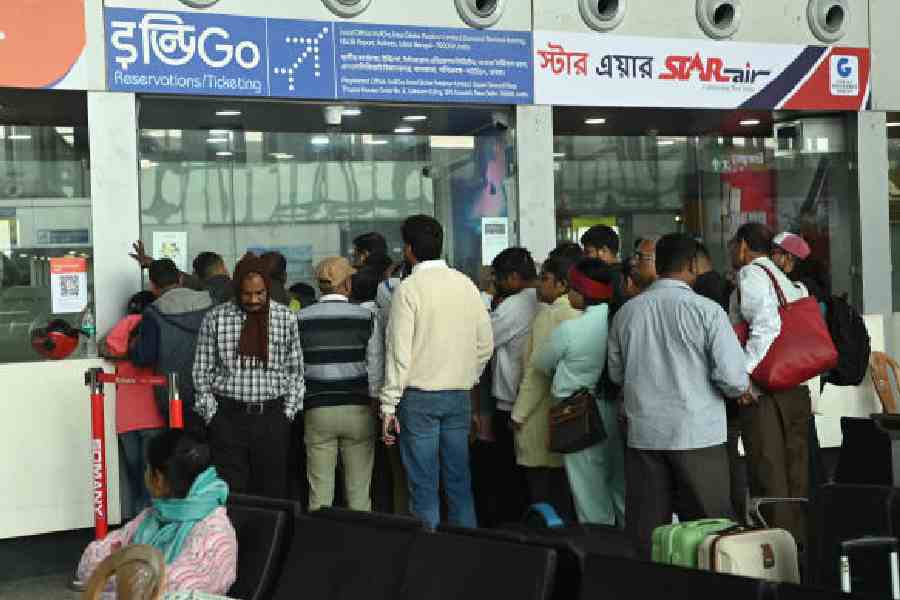This Friday, Shefali Shah — and those eyes that speak even without words — returns to reprise her tough cop Vartika Chaturvedi in Season 2 of Delhi Crime. The hugely popular and critically acclaimed Netflix series, whose first season won India its first-ever International Emmy, plunges into Season 2 with Vartika right at the front and centre of another grisly crime that she has to race against time to solve.
Fresh from the success of her film Darlings, Shefali spoke to The Telegraph on becoming Vartika once again, the evolution of Season 2 and how Delhi Crime has changed her.
In many ways, Delhi Crime has been a game changer for you, something that you have consistently acknowledged. Counting down to Season 2, are the emotions any different from what they are for you before the release of any other project?
Yes, they are different. DC (Delhi Crime), as you rightly said, has been a game changer for me. It’s extremely close to my heart... probably closest to my heart than anything ever can be (smiles). Vartika (Chaturvedi) is my favourite among all the characters that I have played... I am very possessive about her! The first season of DC went places and it was just amazing! Vartika became larger-than-life... I had never expected that.
Right now, I am excited...
I am very nervous, but I am also very proud of what we have done with Season 2. I think there is a tremendous growth in the characters... they are far more evolved, they are far more human, I feel. So ya, there is a lot of excitement, which I think is also in the audience. There is nervousness, which is always attached to anything that is as special as this show. Honestly, I am attached to everything I do! (Laughs) I really, really hope that everyone watches Season 2 as an individual entity and not carry the shadow of the first season.
Does the International Emmy win for the first season, the first-ever for India, weigh heavy on you or do you put it down to a good pressure to have?
Well, it’s great that DC1 won it. Honestly, at the beginning, we didn’t know which way the show was going to go. Netflix came on board later. We didn’t know it would be showcased at Sundance (Film Festival, in 2019). We didn’t know it would win an (International) Emmy. But we created the show with a lot of passion and obsession and madness and love... and a lot of hard work.
It’s not that I do something hoping that I will get a prize for it. I don’t think that’s the right way to approach any kind of work. It was done because we were obsessed with the show... and the same kind of creative obsession has gone into the second season.
In hindsight, why do you think Season One worked across all demographics despite having such a dark, sensitive and triggering subject?
Because it was a case (the 2012 Delhi gangrape) that hit really hard! Not just people in our country, but internationally as well. As someone who was sitting on the outside when the Nirbhaya case happened, I was asking the question, ‘Why is no one doing anything about it?!’
When I did the show, I realised that not only was someone doing something about it, that ‘someone’ was a woman. And she (Chhaya Sharma) got those guys in five days! That became cathartic for a lot of people. It was like, ‘Okay, someone is there to protect us’. So the whole backlash that the police got at that point of time wasn’t really fair... it wasn’t due. And we were not aware of it. Delhi Crime brought that out into the world. The idea of the show was never to sensationalise the crime. It touched the right chords and the right emotions.
You had to do a lot of prep for Season One, including spending quite a bit of time with Chhaya Sharma. With Vartika Chaturvedi firmly embedded in you now, what kind of homework did Season 2 demand?
When you are doing a show, it’s a lot of responsibility. It’s not a one-hour film... it’s a five-hour, eight-hour film. That is a lot of work. Like Season One, this season is built over a short span... it plays out over three-four days. So there was a continuation that had to be maintained. The exhaustion level had to be shown.
I also feel that Vartika is far more evolved in the second season. In the first season, there was no wavering of moral compass, there was no second thought attached to, ‘This is wrong and I am going to set it right.’ This season is not as simple. Here, Vartika has evidence, there is a protocol and a procedure that needs to be followed, but her instinct says that there is something else about it that she can’t pinpoint... even though everything is pointing in a certain way.
Also, she is working under a lot of pressure. The tone at which Vartika starts Season 2 is very different from the first season. When she’s informed about the crime and she goes in, she’s far calmer. This is her day-to-day job... she does this for a living, but she, of course, hates the brutality that inevitably comes with it. But she goes in very matter-of-factly thinking that she has to solve this, and then faces the dilemma of, ‘Am I doing the right thing?’ She falters, she has flaws and she accepts them... she doesn’t shy away from apologising.
Season One of Delhi Crime was about the crime, the police procedural that followed and the characters that were introduced. DC2 is first about these characters, and then there is a crime.
For me, prep is always an integral part of any role. I don’t know how else to work and I don’t want to go on set looking like a fool! Particularly when I had to fulfil the high expectations that Vartika created in Season One.
What intrigued me in Season 2 was that even before Vartika is thrown into the crime, her exhaustion is clearly visible. There is no effort made to hide the dark circles under the eyes or the overarching feeling that she is carrying a huge weight on her shoulders. How important is that in building Vartika and her world?
The season kind of continues from her drive back home in the first season. There is a visible tiredness to her demeanour. And it’s not just physical exhaustion. She understands what can push a person over the edge. Though she’s on the right side, she also understands the culprit’s thought process. This season also has a huge focus on the disparity between the rich and the poor, and Vartika acknowledges that. The marginalisation of a particular community bothers her. She solves the case, but it’s not a victory for her.
Vartika is a steel magnolia with nerves of steel but also possesses a huge amount of empathy. How do you consistently walk that tightrope?
I like to believe that I am an empathetic person (smiles). I care, I genuinely care. I acknowledge stuff. I don’t live in a castle high up in the mountains, not knowing what is going on around me. I can see, I can empathise... and thank God for that. That is also Vartika’s strength.
In a lot of ways, she and I are very similar. She cares for her team... she knows that she is who she is because of her amazing team. With her, what you see is what you get... there is no facade to Vartika at all. She also realises that she has authority, but she doesn’t need to rub it in someone’s face. There are a lot of times when she can flip. Does she choose to? No. She reins it in for the greater good.
In real life, can you rein it in when you are angry?
No! (Laughs) I am very transparent. I don’t go around screaming and shouting, but I don’t have that much of a thought process.
Has playing this character changed you in any way?
I don’t know. Maybe it has subconsciously. She’s just made me so much richer, ya (smiles). As an actor, for sure. And being an actor is such a huge part of me as a person. Delhi Crime was huge for me, it changed my way of working completely. Now when I work on other projects, I do it like I did it on Delhi Crime.
How has it changed the way you work?
I would read interviews of Hollywood actors where they said how they kept re-reading scripts. With a film, once you read a script twice or thrice, you know the film, or at least you think you do. With a show, you have to keep revisiting the script regularly. Every time I finish a scene and I get my scenes for next day, I have to start from Day One. The need to remember every detail is so important. I work like that now, and I am so glad I do.










